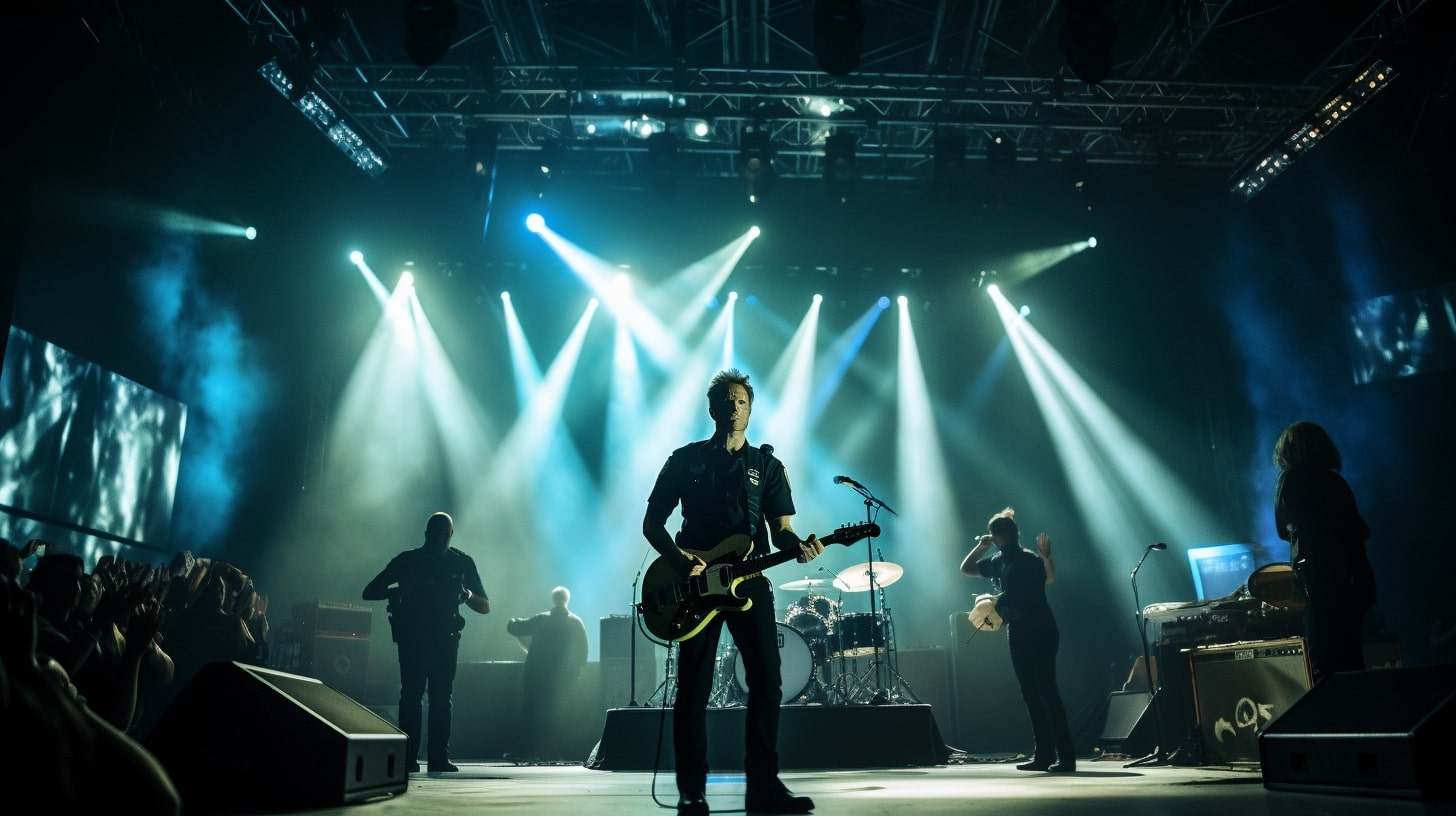The breakup of The Police, one of the most iconic bands of the late 1970s and early 1980s, remains a topic of fascination for music lovers and fans worldwide.
The trio, consisting of Sting, Stewart Copeland, and Andy Summers, achieved tremendous success with their unique blend of rock, reggae, and new wave influences.
However, their journey together was not without its challenges, and the decision to part ways in 1986 left many wondering: why did the Police break up?
To truly understand the reasons behind their breakup, one must delve into the individual motivations and dynamics within the band.
Contents
Why did the Police Break up?
The Police broke up because of their intense relationship, filled with living and traveling together. This eventually led to ego clashes that hindered their creative process. Being in a band is not just about making music together; it’s about living every aspect of your life with your bandmates.
The constant togetherness can create a deep bond but also lead to tensions and conflicts. In the case of The Police, their band dynamics became strained as their roles within the group became less flexible, and their egos began to take center stage.
Creative differences also played a significant role in the breakup of The Police. As they grew as musicians and individuals, each member developed their own musical influences and ideas. This divergence in musical direction caused friction within the band as they struggled to find common ground and maintain their unique sound. The clash of creative visions hindered the flow of ideas and ultimately led to a breakdown in their ability to collaborate effectively.
The breakup of The Police also had an impact on their fans. The band had gained a loyal following throughout their career, and their breakup left many fans disappointed and longing for more. The intense energy and unique chemistry that The Police brought to their music was something that fans had come to love and expect.
The loss of this iconic band marked the end of an era and left a void in the music industry that has yet to be filled. Despite the challenges and conflicts that led to their breakup, The Police’s impact on fans remains undeniable, and their music continues to resonate with audiences worldwide.
Why Sting Really Left The Police
Surprisingly, like a bolt of lightning in a clear sky, Sting’s departure from The Police struck the music world with a mix of shock and sadness. The band had been known for their creative differences and occasional disputes, but no one expected their charismatic frontman to call it quits.
Sting’s decision to leave the band was primarily driven by his desire to pursue a solo career. While The Police had achieved immense success and popularity, Sting felt the need to explore his own artistic vision and create music that was more personal and reflective of his individuality.
However, Sting’s departure from The Police was not solely motivated by his solo ambitions. The band dynamics had become increasingly strained over the years, with tensions and disagreements affecting their working relationship. Despite their musical brilliance, the clashes between Sting, Andy Summers, and Stewart Copeland had reached a breaking point. The decision to disband was not easy, but it was ultimately the best choice for all parties involved.
Following his departure from The Police, Sting went on to have a successful solo career, releasing hit albums and establishing himself as a respected musician in his own right. His post-Police projects showcased a different side of his artistry, allowing him to experiment with various styles and collaborate with different artists.
Sting’s decision to leave The Police marked the end of an era but also opened doors for new musical ventures and creative exploration.
How The Police came together
Like a fateful meeting of musical minds, Sting’s hidden talent on stage caught the attention of drummer Stewart Copeland, leading to the birth of The Police and the start of a legendary journey.
In the mid-1970s, Sting, then known as Gordon Sumner, was a schoolteacher by day and a bassist for a small-time jazz-funk band by night. During one of their performances, Copeland, a renegade drummer with a keen eye for talent, recognized something special in Sting. Impressed by his stage presence and songwriting abilities, Copeland approached Sting with a proposition to form a new band and take their music to the next level.
Eager for a change and fueled by the excitement of this new venture, Sting packed his bags and joined Copeland in London. The duo’s early influences were rooted in punk and reggae, as they drew inspiration from the rebellious spirit of the times. However, their musical collaborations truly came to life when guitarist Andy Summers entered the picture. After witnessing The Police perform at the Marquee, Summers was captivated by both Sting and Copeland’s talent and offered his services.
With all three members firmly in place, The Police embarked on a journey that would soon catapult them to success and fame.
The Police quickly gained recognition for their energetic live performances and unique blend of rock, punk, and reggae influences. Their sound was fresh and innovative, capturing the spirit of the late 1970s and early 1980s. With hits like ‘Roxanne,”Message in a Bottle,’ and ‘Every Breath You Take,’ The Police became a global sensation, selling millions of records and filling arenas worldwide.
Their success and fame were undeniable, leaving a lasting legacy in the music industry. Even after their breakup, The Police’s impact can still be felt today, as their music continues to inspire and influence new generations of musicians.
Why did Sting drop The Police?
Imagine being at the peak of your success, surrounded by fame and fortune, only to realize that it feels like you’re drowning in a sea of unhappiness and unfulfillment – that’s the moment when Sting knew he had to walk away from The Police.
Despite the band’s massive success, Sting found himself longing for something deeper and more fulfilling. The constant pursuit of fame and fortune had taken its toll on him, leading him into a state of depression. As his creative instincts started to lean towards a solo career, the gulf between him and his bandmates grew wider. The Police were no longer offering him the kind of satisfaction he desired. It was a difficult decision, but Sting knew he had to follow his heart and forge his own path.
Sting’s departure had a profound impact on the music industry. The Police were at the height of their fame, and their breakup shocked many. The band had achieved tremendous success with their unique blend of reggae, rock, and pop, becoming one of the most influential bands of their time. Sting’s decision to leave the band left a void that could not easily be filled.
Following his departure, Sting embarked on a successful solo career, releasing hit albums and establishing himself as a formidable artist in his own right. His solo work showcased his versatility as a musician and songwriter, and he continued pushing his sound’s boundaries. While The Police had a distinct sound and style, Sting was able to explore different genres and experiment with his music as a solo artist.
Over the years, discussions and speculations have been about a possible reunion of The Police. Fans have eagerly awaited the possibility of seeing the band back together, but so far, it hasn’t materialized. Despite the disappointment, Sting’s decision to leave the band remains a pivotal moment in music history, highlighting the complexities of band dynamics and the pursuit of personal fulfillment.
Sting had a lot of post-Police success
You can’t help but be captivated by the immense success that Sting achieved after parting ways with The Police. His solo career took off in a way that many could only dream of.
Sting’s musical influences became more pronounced as he delved into different genres, constantly pushing the boundaries of his sound. From jazz to reggae to world music, he fearlessly explored new territories, creating a unique and eclectic body of work resonating with worldwide audiences.
But Sting’s success wasn’t just limited to his musical endeavors. He also made a significant impact through his philanthropic work. His commitment to causes such as human rights, environmental conservation, and education earned him admiration and respect from fans and critics alike. Sting used his platform to raise awareness and funds for various charitable organizations, proving that his passion extended beyond the stage.
In addition to his musical and philanthropic achievements, Sting also ventured into the world of acting. He appeared in several films and stage productions, showcasing his versatility and proving that his talents extended beyond music. His performances were praised for their depth and authenticity, further cementing his status as a true artist.
Throughout his solo career, Sting collaborated with various artists, constantly seeking new creative partnerships. From duets with iconic musicians like Eric Clapton and Annie Lennox to unexpected collaborations with artists from different genres, Sting’s willingness to collaborate demonstrated his open-mindedness and artistic curiosity.
Sting’s solo career has been marked by immense success, artistic exploration, and a commitment to positive impact. He continues to captivate audiences with his music, philanthropy, and ventures into other creative realms. Sting’s post-Police journey is a testament to his unwavering dedication to his craft and his constant desire to evolve and push boundaries.
The other two guys also had success after The Police
Step into the spotlight and discover the hidden gems of success that Andy Summers and Stewart Copeland unearthed, shining brightly after their time with The Police. While Sting may have taken the lion’s share of the spotlight, Summers and Copeland carved out their own paths to musical greatness. Both musicians embarked on successful solo careers, showcasing their individual talents and pushing the boundaries of their musical abilities.
Andy Summers, in particular, flourished as a prolific solo artist, mesmerizing audiences with his jazz albums and experimental instrumental compositions. His talent even earned him the prestigious opportunity to perform at Carnegie Hall in 2005, cementing his status as a virtuoso guitarist. Additionally, Summers showcased his versatility by composing scores for popular films, including the critically acclaimed ‘Biography.’ His ability to seamlessly blend various genres and create captivating music has solidified his place as a respected musician and composer.
Similarly, Stewart Copeland’s post-Police success is not to be overlooked. He’s made a name for himself as a highly sought-after composer in the film and television industry. With an impressive list of credits that includes scoring for beloved shows like ‘Babylon 5’ and iconic movies like ‘Wall Street’ and ‘Highlander 2,’ Copeland’s musical collaborations have left an indelible mark on popular culture. His ability to create captivating and memorable soundscapes has garnered him critical acclaim and contributed to the success of numerous projects.
Despite their individual achievements, there is no denying the enduring legacy and influence of The Police. While Sting, Summers, and Copeland have pursued their own paths, they’ve occasionally reunited on stage, reminding fans of the magic they created together. Their chart-topping hits and the unique chemistry they shared continue to resonate with audiences worldwide. The success they’ve achieved individually only serves to highlight the immense talent and musical prowess that brought them together in the first place.
Wedding bells lead to an accidental reunion
After achieving success in their respective solo careers, it seemed like the members of The Police had moved on from their days as a band. Sting, Andy Summers, and Stewart Copeland flourished in their musical journeys, proving they could thrive independently. However, fate had a different plan in store for them.
In an unexpected turn of events, a joyous occasion ignited the sparks of their once-powerful musical connection. It was Sting’s wedding day, a day filled with love and celebration. Little did he know that this special day would also become the catalyst for a rekindled friendship and an accidental reunion. As the reception unfolded, the atmosphere became electric when Summers and Copeland, Sting’s former bandmates, were in attendance. The mere presence of all three musicians in one venue sparked a flurry of demands from the guests, urging them to come together on stage.
Initially hesitant, Sting was reluctant to participate in a reunion he had always claimed disinterest in. However, as the night unfolded and a couple of drinks were consumed, the magical power of shared memories and a renewed passion for music took hold. With their instruments already set up on stage by the previous band, the three musicians could not resist the pull of their shared history. In a moment of spontaneity, they decided to collaborate once again, performing their iconic songs ‘Message in a Bottle’ and ‘Roxanne.’ The crowd erupted in wild excitement, yearning for more and hoping this accidental reunion could signify things to come.
While The Police were not yet ready to officially reunite, this unexpected musical collaboration at Sting’s wedding planted the seeds of possibility. The rekindled friendship and the undeniable joy they experienced on stage that night served as a reminder of the profound connection they shared as a band. Little did they know that this accidental reunion would pave the way for future conversations and, eventually, a momentous decision that would bring them back together once more.
The band finally gets back together
Finally reunited, the trio of ex-Police members came together on stage, their instruments waiting, as the crowd eagerly anticipated the magic that was about to unfold.
It was a moment that fans had been dreaming about for years, a reunion that seemed impossible until now. The band’s reunion plans were kept tightly under wraps, surprising even their closest friends and family. But as the first notes rang out and the familiar melodies filled the air, it was clear that this was a moment that would go down in music history.
The band dynamics had certainly changed since their initial split. The members had grown individually, both as musicians and as individuals. The years apart allowed them to explore new sounds, experiment with different genres, and refine their craft. And now, as they stood on that stage together, it was evident that their musical evolution had brought them back to their roots, to the very essence of what made The Police so special.
The chemistry between Sting, Stewart Copeland, and Andy Summers was undeniable as if they had never been apart. Their passion for the music and their shared history created a powerful energy that resonated with every fan in the audience.
Fans’ reactions were a mix of excitement, disbelief, and overwhelming joy. The news of The Police’s reunion spread like wildfire, and tickets for their shows sold out within minutes. The anticipation leading up to that first performance was palpable as fans eagerly awaited the chance to relive the magic of their favorite band. And when the moment finally arrived, the crowd erupted in thunderous applause, their cheers echoing throughout the venue. It was a testament to the enduring legacy of The Police and the impact their music had on generations of fans.
As the final notes of their farewell tour echoed through Madison Square Garden, the question on everyone’s mind was what the future held for this legendary band. While the reunion tour marked the end of an era, it also opened the door to new possibilities. The band members had hinted at future projects, leaving fans hopeful for more music and performances to come. The reunion reminded them of the power of their collective talent and the magic they could create together. And as the curtain fell on this historic reunion, the crowd knew that The Police’s legacy would live on, forever etched in the annals of rock and roll history.
Conclusion
In the end, the story of The Police is one of triumph, heartbreak, and a serendipitous reunion. Like a phoenix rising from the ashes, this iconic band emerged from the depths of uncertainty to become one of the most influential groups in music history. Shrouded in mystery and speculation, their breakup left fans longing for more.
Yet, this very separation allowed each member to explore their artistic paths, ultimately leading to their post-Police success. With his mesmerizing voice and poetic lyrics, Sting soared to new heights as a solo artist. His magnetic presence on stage and his ability to captivate audiences were unmatched.
Meanwhile, the other two members, Andy Summers and Stewart Copeland found their own creative endeavors, proving that The Police’s talent ran deep. It was as if each member had been a piece of a puzzle, waiting to be placed in the right position to fully showcase their brilliance.
But, as fate would have it, it was a joyous occasion that brought the band back together. Like a long-lost love rekindled at a wedding, The Police found themselves accidentally reunited. The chemistry was still there. The music still resonated with the same electrifying energy.
And so, after years of anticipation, The Police finally got back together, reminding the world of their extraordinary talent and leaving an indelible mark on the music industry once again.
In conclusion, the story of The Police is a testament to the power of perseverance and the undeniable bond that exists between musicians. Their breakup, though bittersweet, allowed each member to shine individually, paving the way for their remarkable solo careers.
And yet, it was their accidental reunion, sparked by the joy of a wedding celebration, that brought them back into the spotlight. The Police’s music continues to transcend time, their legacy forever etched in the hearts of fans worldwide.
As we reflect on their journey, we are reminded of the magic that can happen when three extraordinary talents come together, creating a harmonious symphony that will forever echo through the halls of music history.






